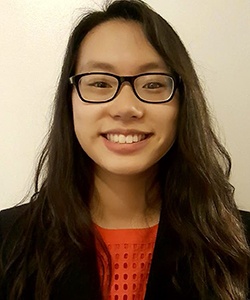Meet Emily Ding

Degree: BS Psychology '19
Co-op:
R&D Business Operations and Portfolio Management, Johnson & Johnson
Extracurricular activities: Psi Chi Honors Society in Psychology; Department of Psychology Ambassador; Teaching Assistant for CIVC 101
Awards: W.W. Smith Scholar
Which element of your Drexel experience do you identify with most, and why?
The co-op program and the research opportunities were what initially attracted me to Drexel, but really, the ability to tailor your education to identify and cultivate your interests is the element of Drexel that I most identify with.
How was your co-op experience?
My co-op was at Johnson & Johnson, working in portfolio management for the medical devices division of the company; it was a great learning experience and probably one of the highlights of my Drexel experience!
Going into my co-op, I knew that I wanted to explore something outside of my major. The beauty of psychology is that it’s applicable to nearly all professions — anywhere there are people, there’s psychology. Even though my major did not directly apply to my co-op, the skillsets I had developed from my coursework and research experiences allowed for a seamless transition into my co-op position.
I think that this a testament to the quality of the psychology program as well. Whether you decide to do a co-op in research, in industry, or in something entirely unrelated, the hard and soft skills that are taught and reaffirmed in every class make it possible to take your major to virtually whatever position or industry you see fit.
Tell us about any research experiences you’ve had as a Drexel student.
I have had the opportunity to be involved with three research experiences during my time at Drexel. My first research experience was through the STAR Scholars program, where I spent the summer of my first year working on treatment interventions for eating disorders in a research lab that is now part of Drexel’s Center for Weight, Eating and Lifestyle Science (WELL Center). My second research experience was also under the WELL Center, examining eating disorders. My last research experience is through my senior thesis, where I am examining the role of social support on the academic achievement of minority students.
Looking back at these experiences, a great part of the psychology department is that there are so many opportunities available for undergraduates to engage in various areas of research. Even if the area of research that you’re interested in isn’t directly related to a faculty member’s interest, the department will go out of their way to make sure that you are able to get in contact with someone who does engage in that research.
What has made your experience at Drexel special or unique?
The ability to engage with many experiences both within and outside my major has definitely made my Drexel experience a unique one. Throughout my time here, I’ve had the opportunity to work in clinical psychological research, present the findings of my research at university-sponsored conferences, co-op in a completely different industry just to experience what it would be like, gain teaching experience — and the list goes on. Whether you want to take a more traditional approach to your major or venture out explore classes in other areas, anything is possible!
Why would you recommend your degree program at Drexel?
One of the best aspects of the psychology at Drexel, and why I recommend the program, is because of the abundant number of opportunities that the psychology program provides for students to discover and cultivate their interests within psychology. Psychology in of itself is a large field with many sub-specialties of study, so it may be daunting at first to figure out where your interests lie. However, the best part of the program is that there are number of avenues for you to explore those interests, from the faculty mentorship program to the coursework and research opportunities. Regardless of where your interests lie in the field, nine out ten times, there is some way for you to further explore that area of interest.
Above all, the greatest part of the psychology program at Drexel is the support that you’ll receive from the faculty, advisors and staff, and students! Everyone in the department genuinely cares about your success as a student and will make a concerted effort to help you get to where you want to ultimately want to be.
What advice do you have for a high school student looking for an undergraduate program?
The transition from high school to college can often be a daunting process. These sentiments seem especially true with Drexel’s fast-paced quarter system, but this doesn’t mean that you need to hit the ground running and be ready from day one. This goes for any college or university. Reach out to your network of family, peers, faculty, and professional staff, and make the most of the all the resources offered. Don’t forget to reach out to the community and its people — they become part of your network the second you step foot onto campus. At any institution, there’s a lot that the campus and its community has to offer; immerse yourself into the new environment and make the most out of it!